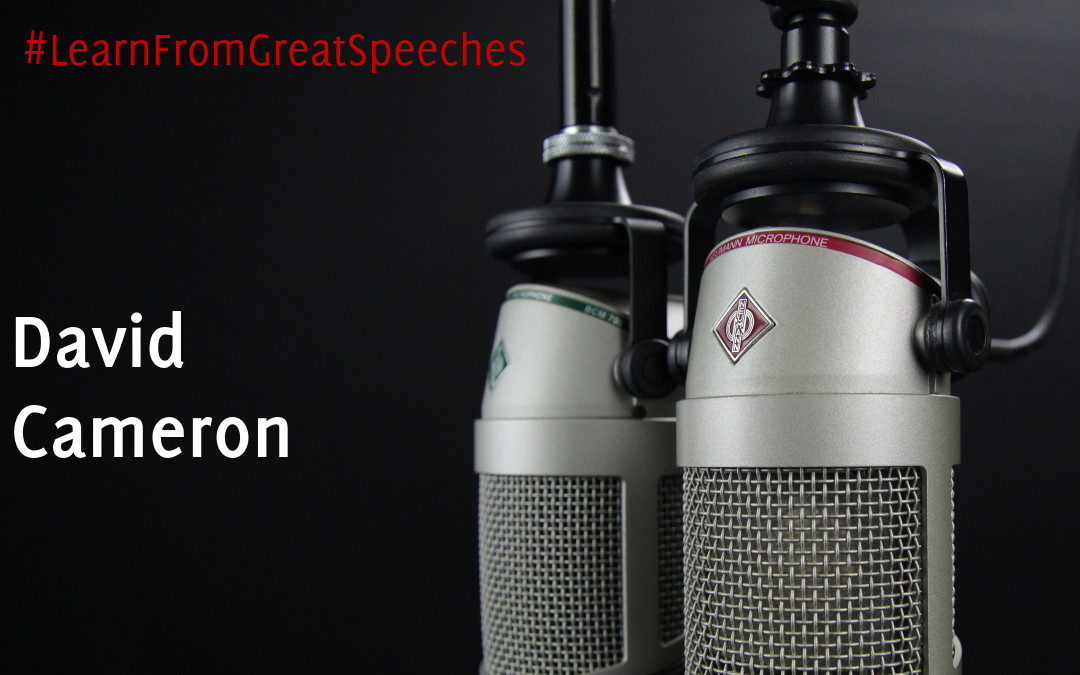January 2013, the speech of David Cameron on the future of Europe is the protagonist of this #LearnFromGreatSpeeches. An address that will go down in history for introducing the Brexit referendum, promised if his party wins the elections. It allows us to observe different strategies to persuade the public.
Anamnesis
Immediately at the opening Cameron uses an anamnesis, that is, an evocative memory to obtain an emotional impact on the audience.
This morning I want to talk about the future of Europe. But first, let us remember the past. Seventy years ago, Europe was being torn apart by its second catastrophic conflict in a generation. A war which saw the streets of European cities strewn with rubble. The skies of London lit by flames night after night. And millions dead across the world in the battle for peace and liberty.
You can use anamnesis for several reasons. In some cases it can increase your credibility as a speaker (ethos), as it demonstrates your knowledge on the subject. It can also be used to define a common territory with the public and therefore get closer to them. As in this case, you can use it to evoke emotions (pathos) in the audience.
The rule of three
It is a very effective, and often used, technique to increase the emphasis of a passage. As the Latins said: omne trium perfectum, or three is the perfect number. David Cameron uses it already at the beginning.
After the Berlin Wall came down I visited that city and I will never forget it.
The abandoned checkpoints. The sense of excitement about the future. The knowledge that a great continent was coming together. Healing those wounds of our history is the central story of the European Union.
The three sentences are vocally articulated to obtain the desired dramatic effect. Even for your audience it is easier to assimilate ideas and concepts that are presented with the rule of three. Just remember to use three statements that are based on important points, do not fall into the trap of adding insignificant details just to get to three!
David Cameron use of vibrant references
Here David recalls Winston Churchill, in this way he creates a continuity and joins one of the most famous prime ministers in the history of the United Kingdom.
What Churchill described as the twin marauders of war and tyranny have been almost entirely banished from our continent. Today, hundreds of millions dwell in freedom, from the Baltic to the Adriatic, from the Western Approaches to the Aegean.
And while we must never take this for granted, the first purpose of the European Union – to secure peace – has been achieved and we should pay tribute to all those in the EU, alongside NATO, who made that happen.
The continuity is appreciated by the public, it gives a sense of greater security. It means that the ideas presented are not perceived as a leap in the dark, rather the natural evolution, or consequence, of what has already been said. What references can you use in your presentations? Who can you connect to? Even better if it is a character highly esteemed by your audience!
Antithesis
In the next passage Cameron puts two ideas in opposition to each other, with a parallel construction.
But today the main, over-riding purpose of the European Union is different: not to win peace, but to secure prosperity.
The challenges come not from within this continent but outside it. From the surging economies in the East and South. Of course a growing world economy benefits us all, but we should be in no doubt that a new global race of nations is underway today.
A race for the wealth and jobs of the future.
The peculiarity of the antithesis lies in the fact that for us it is easier to understand a concept as opposed to another, as in light and dark. Although in this speech the two sentences are not completely opposite, there is still a rhetorically effective contrast. More evident in the second case (inside and outside).
Anaphora
Anaphora is a rhetorical figure that consists of repeating one or more words at the beginning of sentences or subsequent verses, to underline an image or a concept.
Because with courage and conviction I believe we can deliver a more flexible, adaptable and open European Union in which the interests and ambitions of all its members can be met.
With courage and conviction I believe we can achieve a new settlement in which Britain can be comfortable and all our countries can thrive.
(…)
Over the coming weeks, months and years, I will not rest until this debate is won. For the future of my country. For the success of the European Union. And for the prosperity of our peoples for generations to come.
At the conclusion of his speech, David Cameron reuses the repetition technique for a final strong emphasis and to make his ideas resonate even more in the memory of the audience.
When you use anaphora, pronounce well the repetitions and underline them with your voice to increase their effect!


Recent Comments